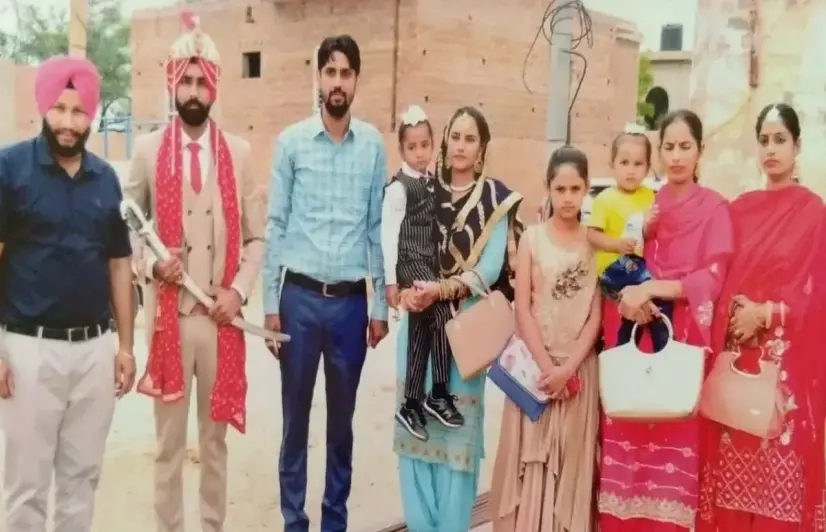COVID-19 alters funeral, wedding traditions in rural Rajasthan

COVID-19 alters funeral, wedding traditions in rural Rajasthan
No Ganga or Kiratpur Sahib, locals immerse ashes in canals and wrap up ceremonies on a budget without hosting a crowd.
Hanumangarh: In Rajasthan’s Malarampura village, farmer Roop Singh’s funeral was a departure from tradition. Few people attended the final rites, as opposed to the large turnout that is the norm.
His asthi visarjan (immersion of bones and ash) did not take place at the holy site of Kiratpur Sahib, owing to virus-related fears and lockdown restrictions. Instead, Singh’s sons Lakhvir and Balvinder buried his ashes in their farm and planted a jamun tree atop it. “We have put our father’s ashes in the lap of mother nature while we invoked Waheguru with full devotion. Surely, he will attain moksha (salvation),” Balvinder told 101Reporters.
Salvation at home
Over the last year, the last rites practices have undergone a change in Rajasthan’s Hanumangarh and Sri Ganganagar districts bordering Punjab. Traditionally, the ashes of the cremated kin would either be taken to Kiratpur Sahib or to Ganga in Haridwar. Now, they are being buried locally or immersed in natural canals.
“It doesn’t seem strange at all because these canals also get water from the Himalayas. It is as pure as that of the Ganga,” said Gurdeep Singh from Sadulshahar in Ganganagar. He lost his grandfather Balvir Singh and uncle Darshan Singh Battu to the pandemic in April-May this year.
The Battu family also held the Antim Ardas — the last prayer — on the third day. It is usually conducted on the tenth or the twelfth day after the bhog and a lot of people are invited. However, only five to seven people attended the ceremony this time. Harpal Singh’s family from Pilibanga in Hanumangarh also scaled down the prayer event to avoid crowding and exposure to the virus.
Events on a budget
The diminished crowd at the last rites and Rasam Pagri (a ritual in which the eldest surviving man from the family ties a turban) has subdued the costs of these events. Many poor people used to take loans of around Rs 1-1.5 lakhs to host the funeral banquet for visitors.
(Left) People immerse the ashes of family members in the canal near Sadulshahar town; (right) At Malarampura, the Singh family buried the ashes of a deceased member at their farm (Picture credit: Amarpal Singh Verma)
Along with the final rites, the grand weddings and retirement parties, which were once a hallmark of Hanumangarh and Sri Ganganagar districts, have been scaled down.
Nand Singh, the big landowner of Malarampura village, wanted his son Gurmukh to marry with pomp in March 2020. Catering arrangements to serve hundreds of guests, orchestra and rental car convoys were readied for the celebration. But, COVID-19 closed all the avenues for the wedding. Several months later, the ceremony took place amidst four to five people, at a fraction of the budget.
Government officials also did away with celebrations marking their retirements. Before COVID-19 started to rage in the country, it was customary for a government employee in the districts to arrange a feast to mark the end of his/her tenure. For instance, when Tej Singh, a teacher from Sangaria town, retired five years ago, he had arranged a buffet that served up to 700 people. But, when his wife retired during the lockdown, there was no scope to host such a grand.
The lack of celebrations, in general, is absolutely no problem for the retired teacher. Singh said, “People had a tendency to spend lakhs on Rasam Pagri or funeral banquets. The trend seems to have disappeared and will probably persist in the future. Now that people have experienced the simple way of celebrations that involves much less money, they will want to keep on celebrating intimately after COVID-19 as well.”
Doctor NP Singh Gill from Sri Ganganagar appreciated the shift in people’s preferences over last year. “They have stopped grand celebrations. Those who felt compelled to organise extravagant events under social pressure now can breathe a sigh of relief. From now on, many people will take to low-key celebrations. People now say that earlier they used to spend money in vain while celebrating births or mourning deaths. COVID-19 has taught them a lesson about the repercussions of wasteful spending,” he told 101Reporters.
Religious standoff
The alteration in traditions, especially to save money, has met with polarised responses from religious pundits. Sardar Harpreet Singh, a disciple of the main Gurdwara of Sangaria, said, “It is not justified when people sacrifice religious traditions to save money. You may do it (a religious ritual) in presence of few people. According to the rules of Sri Guru Granth Sahib, the Antim Ardas should be performed only after the bhog. After all, our elders must have decided the religious arrangements after some thought.”
Pandit Mangilal Saraswat, an astrologer from Sri Ganganagar, sees nothing wrong in having rituals like Rasam Pagri before the stipulated time (the tenth or the twelfth day). “Religion offers solutions and does not deny them. It accepts the circumstances,” he said.
Would you like to Support us
101 Stories Around The Web
Explore All NewsAbout the Reporter
Write For 101Reporters
Would you like to Support us
Follow Us On

